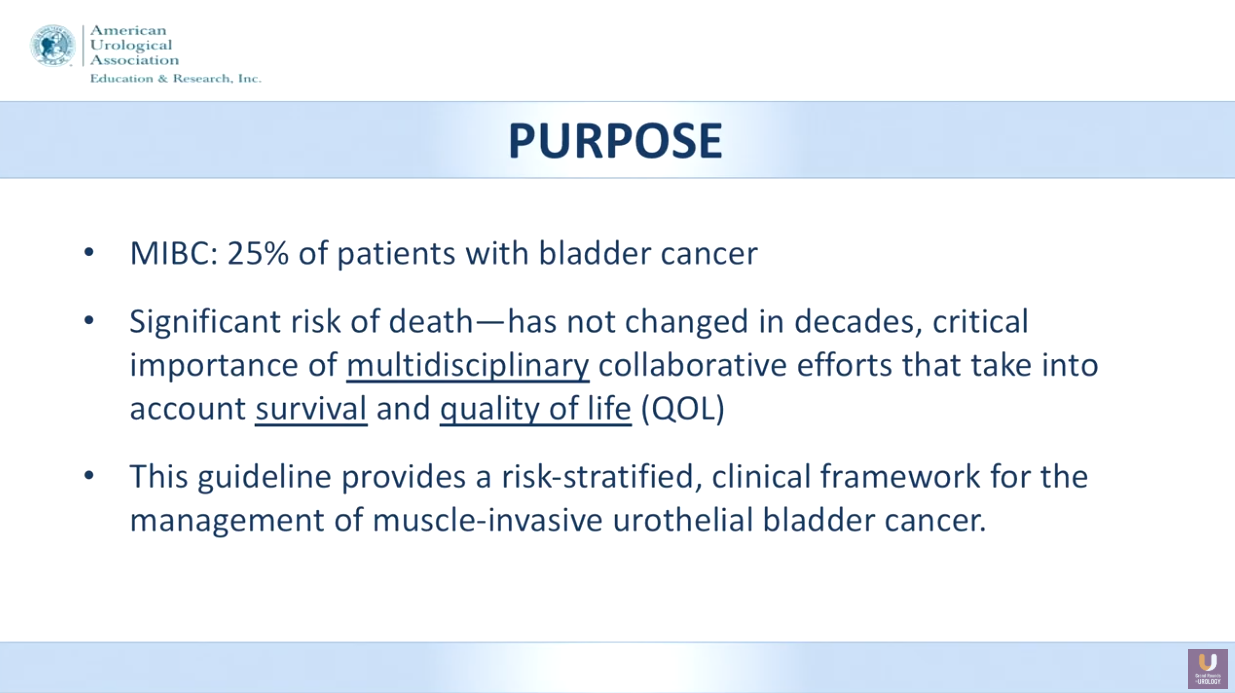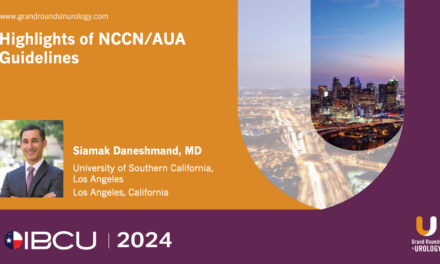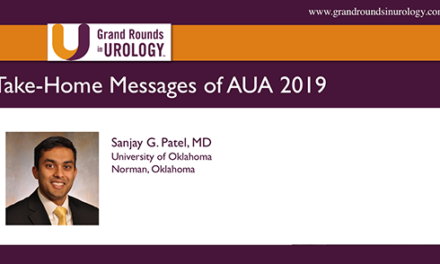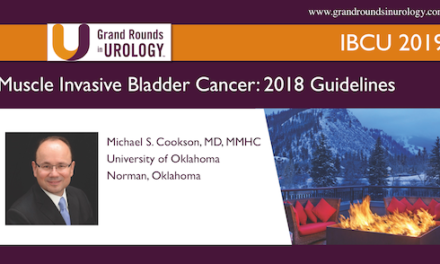Michael S. Cookson, MD, MMHC, presented “Muscle Invasive Bladder Cancer: 2018 Guidelines” during the 27th Annual Perspectives in Urology: Point Counterpoint on November 9, 2018 in Scottsdale, Arizona.
How to cite: Cookson, Michael S. “Muscle Invasive Bladder Cancer: 2018 Guidelines” November 9, 2018. Accessed Oct 2025. https://grandroundsinurology.com/muscle-invasive-bladder-cancer-2018-guidelines/
Muscle Invasive Bladder Cancer: 2018 Guidelines – Summary:
Michael S. Cookson, MD, MMHC, outlines the purpose, methodology, and background for recently released guidelines for treating muscle invasive bladder cancer, including cisplatin-based chemotherapy. He highlights recommendation statements regarding patient counseling, neoadjuvant/adjuvant chemotherapy, radical cystectomy, pelvic lymphadenectomies, and more.
Abstract:
In 2018, the American Urology Association, along with a panel of organizations, created thirty-five guidelines for the treatment of muscle invasive bladder cancer (MIBC), based on randomized controlled trials (RCTs), high-level evidence, clinical principles, and expert opinions.
To note a few of the most important guidelines, the panel recommends offering cisplatin-based, and not carboplatin-based, chemotherapy prior to radical cystectomy (RC). Clinicians should complete the RC as soon as possible (6-8 weeks after chemotherapy). In most cases, this should not be a partial cystectomy. The guidelines also cover decision-making for bladder and organ preservation. Regarding perioperative management, the guidelines highlight Enhanced Recovery After Surgery (ERAS) principles, thromboembolic prophylaxis, opioid antagonist therapy, and counseling patients on urinary diversion care.
Also, the panel strongly recommends performing pelvic lymphadenectomies to help with curative intent, removing at least the external and internal iliac and obturator lymph nodes. For patients that choose a multi-modal bladder preserving therapy, they should undergo a maximal transurethral resection (TUR) of bladder tumor. Furthermore, patients with MIBC should not have radiation therapy as stand-alone treatment.
Additionally, the panel recommends counseling patients on how treatment will affect their quality of life. While clinicians may want to downplay this, it is critical to be upfront about life-altering side effects. Also, physicians should counsel patients about proper nutrition, smoking cessation, and other healthy lifestyle choices in the perioperative setting. Finally, follow-up should include chest imaging, cross sectional CT or MRI imaging of the abdomen and pelvis at 6-12 month intervals for the first 2-3 years, and then annually since most recurrences appear in the first two years.
About Perspectives in Urology: Point Counterpoint
Perspectives in Urology: Point Counterpoint (PCP) is an annual CME-accredited conference devoted to discussing and debating the latest topics in men’s health, general urology, and genitourinary cancers. The conference’s format includes more than didactic lectures. It also includes debates, point-counterpoint discussion panels, and unique case-based presentations. Dr. Cookson presented this lecture during the 27th PCP in 2018. Please visit this page in order to register for future PCP meetings.
ABOUT THE AUTHOR
Michael S. Cookson, MD, MMHC, is Professor and Chairman of the Department of Urology and holds the Donald D. Albers Endowed Chair in Urology at the University of Oklahoma Health Sciences Center in Oklahoma City. He has authored some 240 peer-reviewed journal publications as well as more than 30 chapters of various textbooks, and he is nationally recognized for his outstanding contributions to urologic oncology. Dr. Cookson completed his Urology Residency at the University of Texas, San Antonio, and completed his Urologic Oncology Fellowship at Memorial Sloan-Kettering Cancer Center in New York. From 1998 to 2013, he served as the Vice Chairman of Urologic Surgery and Director of the Urologic Oncology Fellowship Program at Vanderbilt University. Dr. Cookson has devoted much of his academic career to the management of patients with urologic cancers, with a strong emphasis on clinical guidelines, education, and evidenced-based medicine. He was a member of the AUA/ABU Examination Committee for 10 years, serving as Oncology Consultant and Pathology Editor. He also serves on the ABU Oral Examination Committee. He is a Co-Founder of the Oncology Knowledge Assessment Test (OKAT), an SUO-mandated examination. He also served as Chair for the OKAT for 5 years. In 2011, he received the President’s Distinguished Service Award from the SUO for educational contributions. He received the 2018 AUA Presidential Citation for Outstanding Service for his role in the development of the OKAT and as Chair of the Castration-Resistant Prostate Cancer Guidelines Committee at the AUA 2018 Annual Meeting. Dr. Cookson has previously served as a member of the AUA Guidelines on Localized Prostate Cancer Committee. Dr. Cookson is currently serving out the 2019-2020 term as the SUO President.





